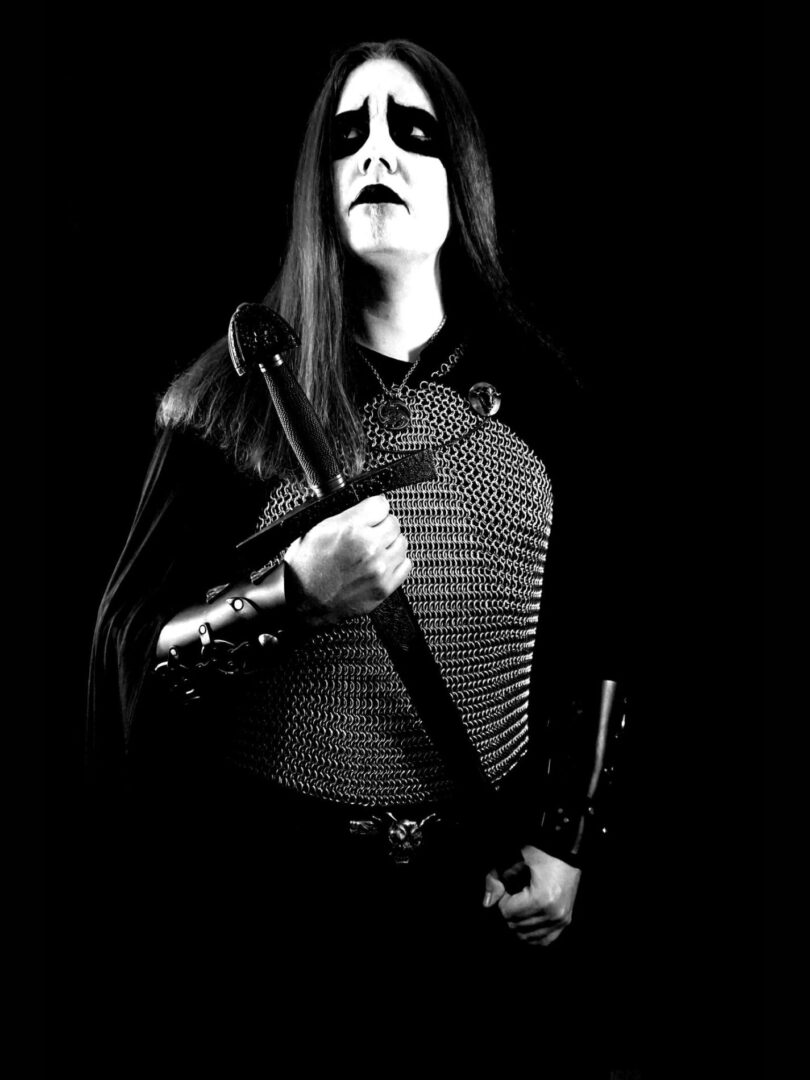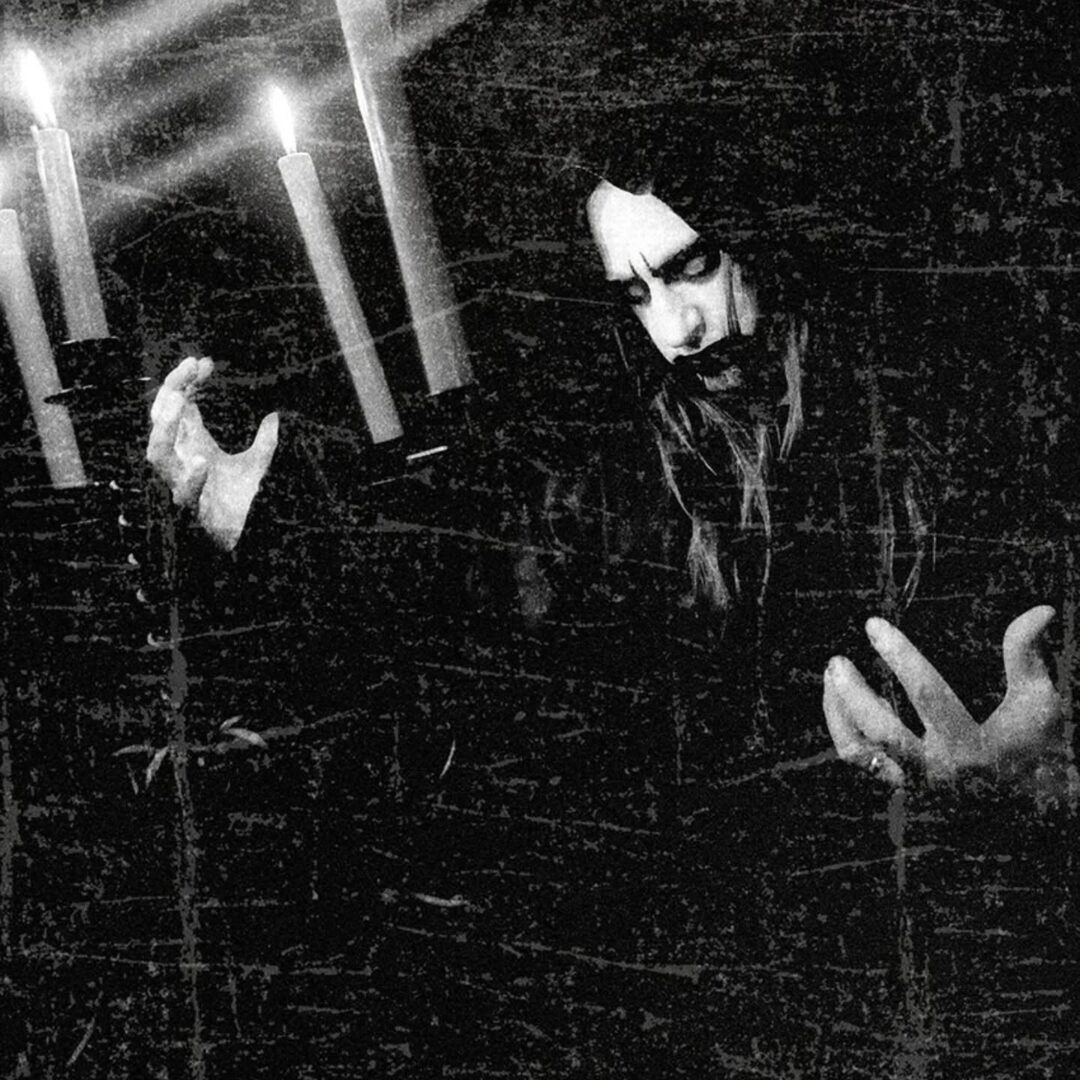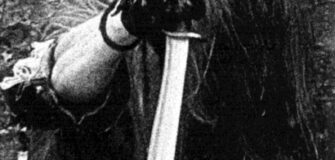Interview: Achathras
Share
Interview by Jeger

“There is much more to ’90s Black Metal than what a lot of newer bands seem to grasp. The glory day of the genre was a pan-European movement, not just a fabled Norwegian affair. So, naturally, the vastly emulated “Old School” Black Metal way of doing things should stretch beyond the scope of Mayhem worship. What of the greats? Dissection, Sacramentum, Gehenna, Taake, “Nightside” era Emperor and Graveland. It was a bounty of influences that constituted the Second Wave sound, and for some collectives, the incorporation of these many influences into their style of play is the only way. It would seem like a hefty task to be able to tie all of these elements together seamlessly, but Achathras has taken to the challenge.
Achathras is an anonymous collective of experienced musicians who have gathered to celebrate the craft in its heyday form: everything from the Symphonic Black Metal stylings of Old Man’s Child to the earthy folkish rendition of the genre as conveyed by early Nokturnal Mortum to the hearty traditional work of Kampfar. Achathras were recently signed to the prestigious Cult Never Dies label, owned and operated by acclaimed Black Metal Historian and Author, Dayal Patterson. And to commemorate this proud union, I have been asked to hold an audience with Achathras for an interview. During my latest interview for This is Black Metal, Achathras provides some insight into the band’s values, their vision and their Debut LP, “A Darkness of the Ancient Past”, scheduled for a September 1 release via Cult Never Dies. ”
This Is Black Metal: Hails! And welcome to This is Black Metal. There is little to be known about Achathras as of yet. Can you tell us a little bit about your background, your values and your vision as a Black Metal band?
Achathras: Achathras aims to express the sense of magic and mysticism that permeated Black Metal in the nineties, in particular during that mid-to-late period of the decade after the dust had settled from the notorious Norwegian scene and the genre was flourishing around the world, but mystique still prevailed (and the mainstream still viewed it with ridicule and bafflement). This was when I first engaged with Black Metal myself. It was a very different time; with Achathras, I want to capture a measure of the essence that I found so magical about the Black Metal being created under those particular conditions. There were a lot of bands active in that period that lacked the notoriety of the big names and have been unfairly overlooked and even maligned in favour of their more illustrious (or controversial) forebears. I have tried to avoid the impulse to fabricate any one band’s sound or produce something ersatz, rather to create something that authentically manifests that magical feeling. That is a challenge of course, as that era is clearly long gone, but my memories are very much alive.
The Black Metal scene of today is obviously very different, and has proliferated beyond any one person’s capacity to keep track of it all. I don’t like to pontificate about exactly what Black Metal should be, as the genre has what I see as a respectable plurality where different sounds and mindsets co-exist while treating the form with due respect. While a Satanic element is clearly fundamental to Black Metal, there is diversity in how literally or figuratively this is taken, and my view is that this is exactly right; a mutant and mutable essence of chaos, destruction and antipathy that has endless permutations.
Black Metal at its best also emanates an essential otherworldliness that absolutely negates the mundane modern world and its onslaught of banality and drudgery. While I will not be drawn on the specifics of my views, these twin senses of otherworldliness and chaos underwrite Achathras’ lyrical content, embedding the Black Metal spirit into what remains, by modern Black Metal standards, very melodic music.
TIBM: You’ve recently been acquired by the renowned Dayal Patterson’s Cult Never Dies. How has this representation impacted the band and what are your plans moving forward?
Achathras: I first spoke with Dayal in late 2008 or early 2009 and have been an ardent follower of Cult Never Dies’ work from the start, with the epochal first edition of “Black Metal: Evolution Of The Cult”. We’re of a similar age and background in terms of our experience of this music, and so it was clear to me that not only would his tastes align with what Achathras does on a basic musical level, but he would also have a rich insight into the purpose and goals of the band.
The reach of Cult Never Dies has already been tremendously beneficial in disseminating our music and vision, just on the basis of our first public song, “Anointed With Moonfire”. Cult Never Dies will be unleashing our debut album “A Darkness Of The Ancient Past” in early Autumn and we will see what the future has in store from there.
TIBM: There is a vast number of underground Black Metal bands who claim to represent the genre in its ‘90s Second Wave form, but what you usually get out of these groups is a carbon copy of Norwegian product, as opposed to the multifaceted approach taken by Achathras. What is it about the ‘90s era of Black Metal that you appreciate most?
Achathras: While I think I may have pre-emptively answered this question in part already, that particular period of Black Metal is how I discovered the genre; it utterly entranced me and transmuted my entire worldview. The febrile atmosphere of that time emerged from the unique confluence of conditions, individuals and bands developing the genre in all directions, all operating in the shadows to an extent and driven by the potency and potentiality of shaping an inchoate form. There is a magic to that feeling which is irreducible to a single sound, recording or approach.
Where most bands fall down, I think, is by attempting to recreate the material results of that magic (e.g. the sound and compositional approach of a particular album or band from the period) rather than engaging with the magic itself. When that happens the results, however earnest and heartfelt, tend to be a pastiche at best or an unintentional parody at worst.
TIBM: When you look at some of the Second Wave progenitors as they stand today, it hardly feels as if some of them are still in touch with the essence of True Black Metal. Success and notoriety are both blessings and curses. How do you feel about European Black Metal in its current form?
Achathras: I don’t think I even have a grasp on the current form of Black Metal, European or otherwise, as it exists today. The scene has proliferated so voraciously, become so irreconcilably atomised into specific micro-genres, it’s like trying to count sand. All I can be sure of is that while the conditions in which I first experienced Black Metal are utterly gone, that essence is still somehow alive and accessible to me. I don’t know if it’s possible to explain appreciably, for example, the aura of uncanny mystique around Burzum in the nineties to people who have watched the arch-narcissist himself doing karate kicks on YouTube (and I’m certain that was the point). Crucially, there is still great Black Metal being created, in many different ways, even if some of the most influential names have moved on.
I do have a certain sympathy for those musicians who are perpetually haunted by the most tabloid aspects and reactionary circus around the events of the early nineties – who can blame them for being exhausted or beyond sick of being pestered by the same gauche questions and banal observations? Most of these people have created monolithic works that will stand tall in perpetuity in the genre and have nothing they need to prove; it is their prerogative to move on if that is what they wish. What I object to are those who aim who pull the ladder up behind them, insisting that there is nothing left for Black Metal to say, and/or no one else is worthy of being heard. As far as I’m concerned, that hubris is one of the most cardinal sins of the ageing musician. It doesn’t diminish what they’ve achieved, but it’s an undignified look that makes them appear small.

Achathras
TIBM: You’re set to release your new record, “A Darkness of the Ancient Past” on September 1. What can you tell us about some of the concepts that are explored through the new material?
Achathras: The concepts explored on the album are generally introspective and explore my own experience of Black Metal, a conscious manifesting of what the genre means to me. Without being evasive, I have to say that this is not something I can readily articulate in simple terms; both the music and lyrics together explore the same essence through different mediums, and they communicate for me better than I can with words alone. By no means is this a stream of consciousness, but I have nonetheless striven to create through intuition rather than reason.
I aim to surrender, immerse and sublimate myself in the creative process much as, say, David Lynch does, beholden to the dream logic of his own peculiar impetus. Within this, the lyrics present a series of dream vignettes, very much informed by examples such as Mortiis’ lyrics for Emperor (each of which are like a self-contained painting), or early Burzum (when the imagery was more mysterious and unknowable, before Vikernes retconned his whole discography in favour of Norse mythology exclusively). I think a shared interest in tabletop RPGs was helpful for this, not so much for specific reference points within fantasy, but the grounding it provides in worldbuilding and creating an evocative milieu.
TIBM: Judging by the song titles, the new album appears to bear some spiritual significance. Black Metal is known for the exploration of the Occult, ie Satanism, Paganism, Luciferianism and Qliphoth/Kabbalah to name a few currents. How much does spirituality play into Achathras’ music?
Achathras: I make a very firm point with Achathras not to subscribe to (or allow myself to be proscribed by) any particular occult or spiritual tradition. Achathras is about capturing a feeling or experience rather than demonstrating my grasp of a body of lore or my ability to illustrate such; it is intuition rather than practice.
That process in itself is informed by a range of magickal workings, certainly, but I’m reluctant to anchor that very elemental process to one or another. I reserve the prerogative to make my own meaning – but the music is the clearest expression of that, rather than my attempts to describe it.
TIBM: How would you describe the writing and recording process for “A Darkness of the Ancient Past?”
Achathras: To be frank, I have laughably little to say of the writing process; I am as beholden as any artist to the vagaries of 1/10 inspiration and bloody-minded about the 9/10 perspiration involved, to use the standard cliche. I persevere in doggedly implementing my instincts until a composition feels right or all I have left is wreckage. It can be an infuriating process, but hopefully the results speak for themselves.
The recording process was very staggered. The three members of the band have never (to the very best of my knowledge) at any point been in the same part of the world at once, never mind the same room. We all recorded separately in our own facilities. It was a slow and painstaking process, and by no means the most efficient way to work, but without going into tedious details, this was the practical reality we had to deal with.
TIBM: What are your plans for eventual live rituals in support of the new record?
Achathras: Live performances are not a priority for Achathras, and nothing is currently planned. Under the right circumstances, I would be prepared to do it.

Achathras
TIBM: It’s said that Achathras is an anonymous band. Why have you chosen to keep your identities a secret?
Achathras: It’s very simple. We all have extensive experience and a certain public profile as members of other bands, but I wanted Achathras to be treated entirely on its own terms, without being coloured by other associations. I find it tacky when bands are pushed based on “featuring members of so and so”.
All that happens is you skew the listener’s expectations and give a distorted impression of the band’s intentions. Whether we will be able to sustain the anonymity indefinitely is another question; ultimately, I would like our identities to be irrelevant.
TIBM: It is also said that Achathras is made up of musicians who have extensive experience with other projects. Would you say that Achathras is the culmination of your career’s work or more of a side project?
Achathras: Neither. I dislike the term “side project” as it implies frivolity and more of a throwaway, disposable nature. Nor is it the culmination of my career’s work; the bands I’m involved in all have different modus operandi and goals and complement each other.
Achathras serves a purpose to me that my other endeavours do not, and the reverse is true; one does not diminish another. Achathras is, however, something I have dreamed of doing for a long time, a musical wish fulfilment that it is very rewarding to have finally accomplished.
TIBM: Black Metal is more than a genre of music. For some, it is a way of life. How has Black Metal impacted your life?
Achathras: It was utterly transformative to my experience of and understanding of the world. You can divide my life decisively into two halves just on that point. It led me to engage with questions of spirituality and philosophy in my teens that I may not have discovered until much later, if at all. My worldview was already inclined towards it in many ways, but it’s not an exaggeration to say it crowbarred my adolescent mind open to worlds entirely alien to the typical pre-millennial suburban middle-class milieu.
It was as much of a paradigm shift as dropping acid and opening the doors of perception, and similarly, a one-way street. I don’t say that to lionise Black Metal or to insinuate it has the answers to everything, but at this point in my life, it’s in my DNA.
TIBM: Any final thoughts?
Achathras: Thank you for your support.
TIBM: Thanks for your time.
You Might also Like









